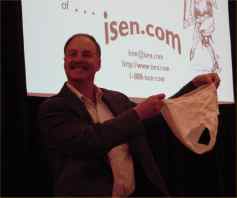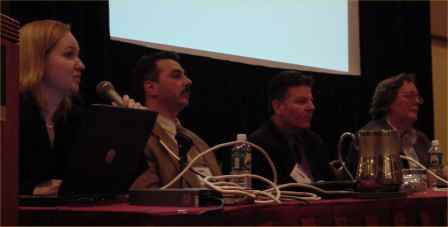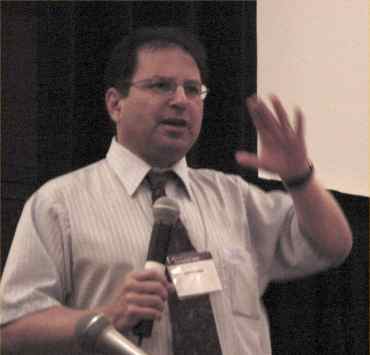Connectivity 2002 – Tuesday Afternoon
Connectivity 2002 – Tuesday Afternoon

David Isenberg showing off
the latest in “fiber to the lap.”
David Isenberg, author of “The Rise of The Stupid Network” has begun his presentation. He’s explained how the telephone network arose as a “smart network” optimized for the services the telephone companies want to sell. The Internet is stupid in that it don’t know how to do nuthin’ but move them bits ’round. And, when you internetwork these networks, the control shifts from the network owner(s) to the end users; no longer can a network provider add features unilaterally, so the innovation has to come at the edges. That’s why the Internet disrupted the telecommunications industry.
[Eric Norlin has blogged about this blogging of the Connectivity conference. He thinks the question of digital IDs is underneath the spam and privacy issues discussed this morning.]
David is saying that the new end-to-end model puts the end-user in control and lets into the mix. Microsoft “gets this in spades”: Windows Messenger under XP lets two users open a voice channel or video channel integrated with the IM window. “SIP will change everything.”
Isenberg’s put up a 2×2 chart. X axis = kilobits to gigabites. Y axis = intelligent network to stupid network. Lower left is telephony, lower right is television, upper left are email and web browsing and internet telephony and games [this is the fun quadrant] and the upper right has “SIX BILLION CHANNELS” open to innovation. “The real important apps haven’t been discovered yet.”
[Kevin Marks has just blogged about this conference also. He proposes a 3-pronged attack on spam.]
Key point: The stupid network decouples connectivity from app building and it’s a mistake to try to be in both businesses. So, what’s the business model for connectivity? Not the phone company which likes vertical apps. Not the cable companies because they’re stuck on the old video paradigm and resist the new distributed model. So what’s left? Municipalities, utilities, customers, and/or something new … which David connects to David Reed’s “We Don’t Know,” fast becoming the conference’s mantra and theme.
Question from the audience: Should we come up with the apps first to drive the infrastructure? Reply from the audience: We did already and called it “Napster.” Isenberg: We have 100 megabits on our desktops but we use only a fraction of that usually, but we’d scream if someone tried to take our bandwidth away; bandwidth comes first.

ISP panel
The ISPs. Chaired by Sue Ashdown of the American ISP Association. Panelists: Ira Kleiner, CEO of ProSpeed Networks. Colin King, co-founder of ProSpeed. Victoria White, CEO of Eclectechs in North Hampton.
Sue: “We’re beginning to see the death of the Internet service provider” because of the consolidation and now because ISPs need to obtain supply. [Artificial scarcity rears its ugly head again.] The actual title of this panel is “What happens if the ISPs don’t get what they want,” but Ashdown opens by asking when have ISPs ever gotten what they want? Now even the Patriot’s Act adds risk to the ISPs because they can’t afford attorneys to fight FBI requests for information about users.
The telephone companies have kept the ISPs out of the market by setting the price for lines to the house so high that the ISPs margins’ shrink pass the point of reason. And the telephone companies through “errors of omission” make it harder for customers to accept ISPs. As a result, the Bells have 86% of the DSL market.
Ira is about to talk. His company – a CLEC (Competitive Local Exchange Carrier) – delivers connectivity to underserved markets in NH and MA. [I have to duck out. See a man about a dog. And, unlike Doc, I’m not going to blog while balancing my laptop on the urinal.] Sue is now saying that she recommends against ISPs becoming CLECs because it brings them under so many regulations.
White began by building web sites; her company did 300 in about five years. “Sometimes running an ISP is like being in an MRI where you hear the field gradients, like someone shooting at you,” but you don’t know where it’s coming from or where the next one will come. They serve a lot of seniors and since they don’t require a credit card to sign up, people come into the office to pay the bill, to pay the dog, etc.
What’s the value of small ISPs? Ashdown says it’s in the ability to serve smaller and niche markets.
The guy from Bway.com, a NYC ISP, says that the only way for smaller ISPs to survive is by adding value rather than by competing on price.
Audience: What do the local congresspeople say when you lobby them? Colin: They don’t understand the technology. (Exceptions made for Markey and Hollings.)

Jeff Chester
Jeff Chester, Exec. Dir. of the Center for Digital Democracy, says that the advertising and entertainment industry’s vision of the new media is the old media. Their vision is to marry the branding power of TV with the interactivity of the Net, resulting in an “advertiser’s nirvana.”
He told about a meeting in the Chamber of Commerce early in the Clinton admionistration where, with the advertising lobby present, Clinton and Gore talked excitedly about the Information Highway. “You’re not really going to let people getheir content over the Internet,” said the advertisers, “That’ll kill our industry.” Jeff knew then that the government would work to restrict the Net to the benefit of those who own the content and sell the advertisements.
[BTW, blogger.com just ate some more paragraphs; it does a 404 when I hit the Post button and can’t get back the new content. Argh.]
[During the break, Jock Gill, former tech advisor to the Clinton White House and a fighter for What’s Right, said that we’re losing the battle because we can’t tell the story without dropping into deep techno-caves. We need a simple way to say what we mean. I may use this idea to structure the session I’m supposed to be leading tomorrow on What the !#$^% Do We Do About It?]
Jeff says that the cable companies have been successful in warding off any attempt to stop their near-explicit goal of controlling the network. He points us to a few sites that including his site: www.democraticmedia.org. “You have a handful of companies gobbling up control of old and new media. If all of the FCC rules go through, one company will be able to own the newspaper, several TV stations, several radios, the cable system, and de facto that town’s major ISP…all tied to a very very meaningless vision of just attracting eyeballs, engaging in what they call t-commerce, developing the branding…”
Jeff: “Go to FCC.gov and go to the Media Bureau and go to Media Mergers and go to the AOL/time Warner public interest statement. You’d think that the biggest media merger in American history…there will only be two benefits. #1 Just by the fact that we’re merging, more people will want more broadand. We’ll make a whole new generation of commercially sticky features.” No one in Congress is speaking out, only Hollings is speaking in the Senate.
Jeff would be happy simply with non-discriminatory access (opening the wires to the competitive market) but, he says, we won’t get that unless we form a movement. Now. “We’re not saying big companies can’t make lots of money. We’re saying they can’t monopolize the network. It should be win-win.”
Isenberg: We need to tell the story, as Jock Gill says. Here’s one way: “The US to be the best auto maker. Not any more. We used to be the best steel maker. Not any more. Do we want to lose the Internet business? We’re on the right track to do just that.”
Jeff: We lost the battle in DC. Now we need to take it local. Show our local reps that it’s win-win for business.
FLASH: Copyright office rejects CARP!! [By the way, I was able to blog this before Isenberg could get the chair’s attention to announce it at the conference. [… which proves what?]]
Categories: Uncategorized dw









